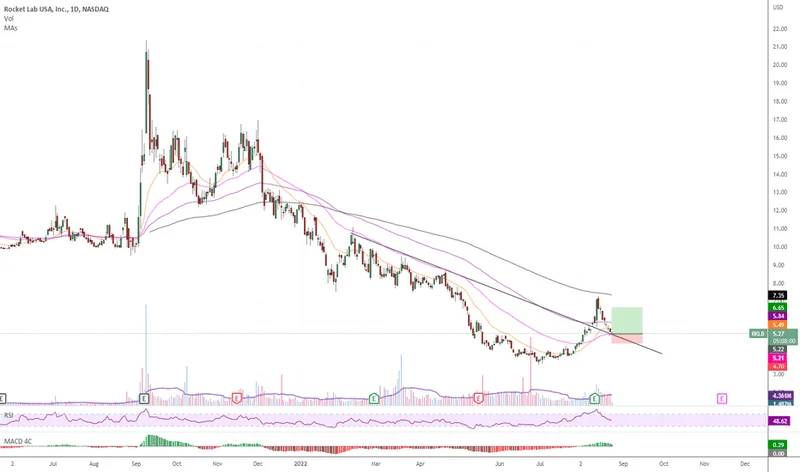XLM Insight | Stellar Lumens News, Price Trends & Guides
XLM Insight | Stellar Lumens News, Price Trends & Guides
Let’s be honest. For most of us, a rocket launch is still an event. We stop what we’re doing, pull up the livestream, and hold our breath as a pillar of fire climbs into the sky. It’s a spectacle, a monumental achievement of human ingenuity. But what if it wasn’t? What if a launch became as routine, as predictable, as a FedEx truck pulling up to your curb?
That’s the paradigm shift I see happening right now, and Rocket Lab is at the absolute heart of it. When their stock (RKLB) jumped over 7% premarket this week, the headlines pointed to a new multi-launch deal with a Japanese firm, iQPS. And sure, that’s the catalyst (Why Is Rocket Lab Stock Surging Wednesday? - Rocket Lab (NASDAQ:RKLB)). But looking only at the deal is like seeing a single car and missing the fact that someone is paving a six-lane superhighway right in front of you.
This isn’t just about sending more satellites into orbit. This is about building the fundamental infrastructure—the reliable, high-cadence, on-demand freeway—that will allow the next generation of the space economy to truly flourish. We’re moving past the era of one-off, bespoke missions and into the age of the celestial supply chain. And it’s happening faster than almost anyone predicted.
The deal itself is a perfect microcosm of this new reality. Rocket Lab signed on for three more dedicated missions for the Institute for Q-shu Pioneers of Space (iQPS), starting in 2026. This brings the total number of launches they’ve contracted with iQPS to a staggering seven. Each of these missions will deploy a synthetic aperture radar (SAR) satellite—in simpler terms, these are satellites that can create incredibly detailed images of the Earth’s surface, day or night, through clouds and smoke. They are the all-seeing eyes for everything from disaster monitoring to agricultural management.
But here’s the detail that really matters: the tempo. Rocket Lab has already completed four launches for iQPS this year alone. Two of those happened within a four-week span between May and June. When I first read about the back-to-back launches, I honestly had to pause. This is the kind of operational tempo we used to only dream about for small satellite constellations. It’s one thing to launch a rocket; it’s another thing entirely to do it with the frequency of a well-run train schedule.
This is made possible by a level of vertical integration that’s just beautiful to see. It’s not just the Electron rocket; it’s the whole ecosystem. The press release mentions Rocket Lab’s “Motorized Lightband” separation system. This might sound like a minor technical detail, but it’s a crucial piece of the puzzle. By designing both the ride and the mechanism that gently pushes the satellite into its final orbit, Rocket Lab offers a seamless, end-to-end service. It's like building both the car and the perfectly paved on-ramp.

Sir Peter Beck, Rocket Lab’s founder, said it himself: iQPS is taking advantage of a “highly-integrated launch service that maximizes reliability and streamlines operations for faster access to space.” That’s not just corporate speak. That’s the mission statement for the entire next chapter of space exploration. What does this relentless, reliable cadence truly unlock for companies like iQPS and the countless others waiting in the wings? And how does it change the very economics of building a business in orbit?
For decades, getting to space was like commissioning a grand, one-of-a-kind sailing ship. It was a massive, years-long undertaking, bespoke, incredibly expensive, and fraught with risk. If your ship sank, your entire enterprise went with it. Rocket Lab is turning that model on its head. They’re not building custom yachts; they’re operating a fleet of cargo freighters on a fixed, dependable schedule.
This shift is as profound as the invention of the standardized shipping container. Before the container, loading a ship was a chaotic, time-consuming puzzle. After, global trade exploded because the system became predictable and efficient. That’s precisely what Rocket Lab is doing for low-Earth orbit. Their announcement that they’re ramping up production to support 20 or more missions in 2025 is the proof—this isn't a distant dream, it's their operational plan for next year.
The speed of this is just staggering—it means the gap between an idea on a whiteboard and a functioning satellite in orbit is shrinking at an exponential rate, which in turn accelerates innovation in every field that relies on space-based data. Imagine what this means. Agricultural companies getting daily, not weekly, updates on crop health. Emergency services getting near-real-time overhead imagery after a hurricane. Scientists getting a constant stream of climate data from a dozen different sensors. This is the world that a reliable space freeway enables.
Of course, with this incredible new capability comes a profound responsibility. As we pave this freeway and the traffic increases, we have to become better orbital citizens. How do we manage the growing number of satellites to avoid collisions and debris? How do we ensure that this new frontier remains sustainable for generations to come? These aren’t secondary questions; they are central to the very future we’re trying to build. Building the highway is the first step; establishing the rules of the road is the critical next one.
For so long, that phrase has been a metaphor for boundless potential. But in a literal sense, the sky was the limit—a physical barrier, a gravitational gatekeeper that made access to space difficult, expensive, and rare. What we're witnessing with Rocket Lab isn't just an improvement in technology; it's the methodical dismantling of that barrier. They're turning the sky from a wall into a gateway. The real story here isn't a stock price or a single contract. It's that the question is no longer if we can get to space, but how fast and how often. The freeway is open. Now, we get to see where it takes us.